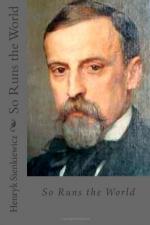There are three periods in Sienkiewicz’s literary life. In the first he wrote short stories, which are masterpieces of grace and ingenuity—at least some of them. In those stories the reader will meet frequent thoughts about general problems, deep observations of life—and notwithstanding his idealism, very truthful about spiritual moods, expressed with an easy and sincere hand. Speaking about Sienkiewicz’s works, no matter how small it may be, one has always the feeling that one speaks about a known, living in general memory work. Almost every one of his stories is like a stone thrown in the midst of a flock of sparrows gathering in the winter time around barns: one throw arouses at once a flock of winged reminiscences.
The other characteristics of his stories are uncommonness of his conceptions, masterly compositions, ofttimes artificial. It happens also that a story has no plot ("From the Diary of a Tutor in Pozman,” “Bartek the Victor"), no action, almost no matter ("Yamyol"), but the reader is rewarded by simplicity, rural theme, humoristic pictures ("Comedy of Errors: A Sketch of American Life"), pity for the little and poor ("Yanko the Musician"), and those qualities make the reader remember his stories well. It is almost impossible to forget—under the general impressions—about his striking and standing-out figures ("The Lighthouse Keeper of Aspinwall"), about the individual impression they leave on our minds. Apparently they are commonplace, every-day people, but the author’s talent puts on them an original individuality, a particular stamp, which makes one remember them forever and afterward apply them to the individuals which one meets in life. No matter how insignificant socially is the figure chosen by Sienkiewicz for his story, the great talent of the author magnifies its striking features, not seen by common people, and makes of it a masterpiece of literary art.




